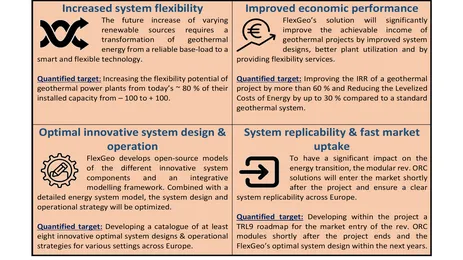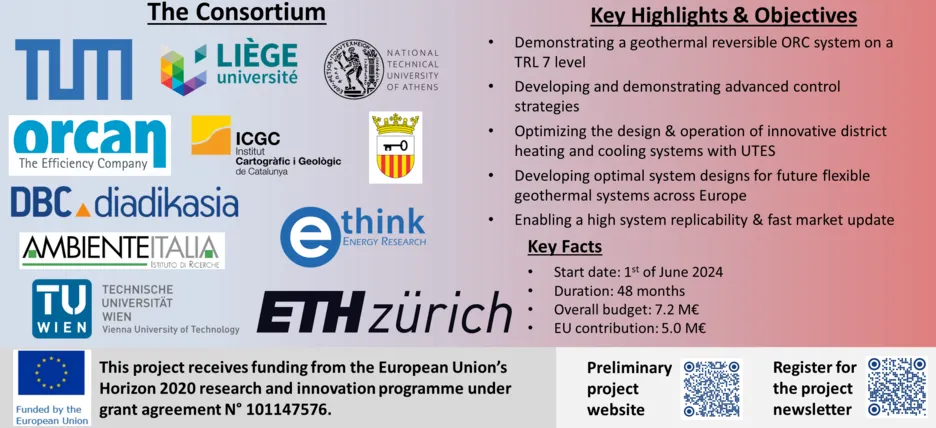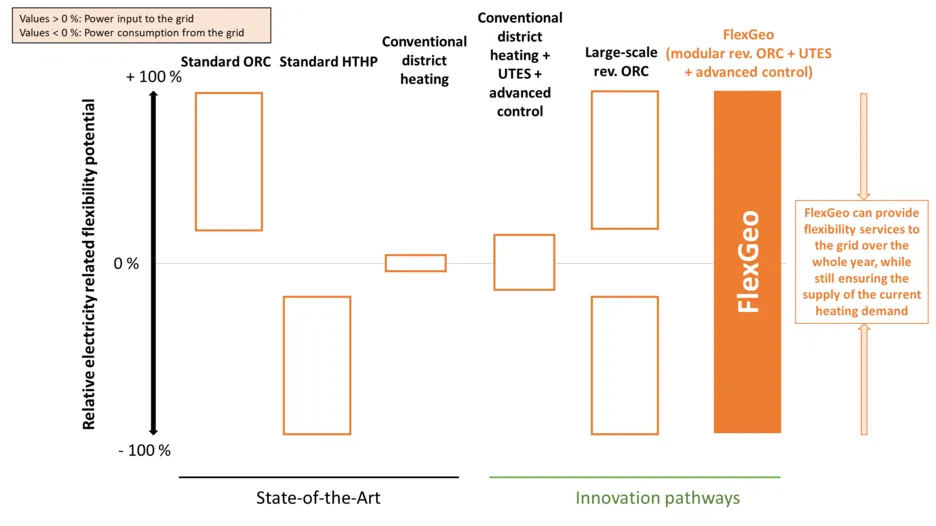FlexGeo

Shaping the future of flexible geothermal energy
The European Research project FlexGeo will develop and demonstrate innovative geothermal energy system designs for maximized system performance and flexibility. Within the project, a major focus will lie on the worldwide first demonstration of a reversible 200 kWel modular Organic Rankine Cycle (ORC) / high-temperature heat pump (HTHP) system on a TRL 7 level. In addition, advanced control strategies for district heating and cooling networks (DHCN) are developed and demonstrated.
The project's results will tremendously increase the utilization of both shallow and deep geothermal energy and, therefore, contribute to reaching the net-zero greenhouse gas emission goal of the European Union. The pivotal goal of the project is to deliver sustainable solutions for the stabilization and optimization of DHCN systems across Europe and to pave the way for the market entry of commercial modular reversible ORC systems.
Keep up to date with our latest news and event invites by registering to our newsletter here and follow our LinkedIn Page. Stay also tuned for our detailed project website, which will be released soon!
The FlexGeo approach relies on the innovative combination of modular reversible ORC units with UTES systems and advanced smart control. This enables the provision of flexibility services to the grid and reaction to the economic market signals throughout the year, while still ensuring the supply of current heating demand.
For this purpose, advanced control strategies based on artificial intelligence, using concepts such as reinforcement learning, will maximize the flexibility of ORC and HTHP and improve system and component-specific monitoring and maintenance. This will also lead to a significant increase in the flexibility capacities of smart thermal grids as well as reduced ramp-up times. Furthermore, the reversible ORC will provide twice its installed capacity for secondary control reserve. Thus, the reversiblity enables that the ORC unit can act as both electricity producer and consumer, depending on the actual needs of the energy system.
A wide range of other numerical tools will also be used to assess and optimize the environmental impact & cost-effectiveness of FlexGeo’s solutions.
FlexGeo aims to develop innovative geothermal energy system designs for maximized systems performance and flexibility. Pathing the way for the market entry of commercial modular reversible ORC systems will be, together with advanced smart control strategies and operational tools, the backbone of our concept. The proposed key-innovations will make geothermal systems more flexible, more efficient, more economically viable and adaptable for an implementation and market update across Europe and beyond. A modular rev. 200 kWel ORC unit with advanced control strategies and operational tool will be installed and demonstrated at a real district heating system. The first-time demonstration of this innovative technology on a TRL 7 level will directly pave the way to its market entry after the project, since due to the attractive modular approach the demonstrator has already the same capacity as the future commercial product. Furthermore, innovative geothermal system designs considering also high- and low-temperature Underground Thermal Energy Storage (UTES) systems, advanced closed-loop systems (AGS) and enhanced flexibility of district heating and district cooling networks, are paving the way to a broad spread of the FlexGeo solutions across Europe and the world, resulting in largescale CO2 emission reductions. The four general main objectives are:

Technische Universität München (Germany) Project coordinator
Technische Universität Wien (Austria)
National Technical University of Athens (Greece)
Université de Liège (Belgium)
Institut Cartogràfic i Geològic de Catalunya (Spain)
ORCAN Energy AG (Germany)
Zentrum für Energiewirtschaft und Umwelt (Austria)
Ambiente Italia SRL (Italy)
Diadikasia S.A. (Greece)
Conselh Generau d'Aran (Spain)
Eidesgenössische Technische Hochschule Zürich (Switzerland)
Keep up to date with our latest news and event invites by registering to our newsletter here and follow our LinkedIn Page.
Christopher Schifflechner - Project coordinator (c.schifflechner@tum.de)
Jannik von Zabienski - PhD student
Aaron Wesemann - PhD student

